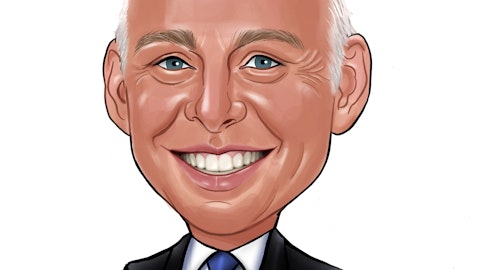Oil prices have fallen around 60% in the last year and a half.
Exxon Mobil Corporation (NYSE:XOM) is the largest oil corporation in the world… The company’s earnings are tied to oil prices. The image below shows ExxonMobil’s stock price through the recent period of falling oil prices.
Despite a roughly 60% decline in oil prices, ExxonMobil stock is down around 20% from highs in mid-2014.
How is this possible? Despite low oil prices, ExxonMobil is still expected to make around $17 billion in 2015…
That is just one of the reasons ExxonMobil is one of the most popular energy stocks among the world-class investment firms tracked by Insider Monkey. ExxonMobil was in the equity portfolios of 61 of those investors on September 30, with them holding $3.19 billion worth of its shares. It should be noted however that this accounted for a mere 1% of Exxon’s common stock, making these top investors underweight ExxonMobil. The 61 investors with long positions also represented a decline from 67 quarter-over-quarter. Richard S. Pzena’s Pzena Investment Management boosted its stake by 46% in the third quarter, to just under 6.11 million shares. On the other hand, Eric W. Mandelblatt’s Soroban Capital Partners made a 425% hike to its position of ExxonMobil shares underlying put options.
ExxonMobil is well diversified within the oil and gas industry. The company operates in 3 segments: Upstream, Downstream, and Chemical. The company’s earnings by segment in its most recent quarter are shown below:
– Downstream earnings of $2.03 billion
– Upstream earnings of $1.36 billion
– Chemical earnings of $1.23 billion
Most businesses can only dream (if they even dream that big) of making over $4 billion a quarter in profit. ExxonMobil is doing this in a very difficult operating environment for the company.
Compare ExxonMobil’s earnings by segment above to its earnings by segment in the 3rd quarter of 2013, when oil prices were high.
– Downstream earnings of $0.59 billion
– Upstream earnings of $6.71 billion
– Chemical earnings of $1.03 billion
In 2 years, the Downstream segment’s earnings have nearly tripled, while the Upstream segment’s earnings have declined by about 80%. The Chemical segment’s earnings have grown by about 20% in the last two years.
This shows how ExxonMobil combats periods of low oil prices. It makes considerably more money in its downstream division.
There’s no question that the Upstream division is ExxonMobil’s ‘cash cow’. When oil prices are high, it generates more on its own than the entire company does when oil prices are low. Obviously, high oil prices are great for ExxonMobil.
Low oil prices, however, don’t hurt the company as much as you’d expect. That’s because low oil prices are good for the Downstream and Chemical divisions.
This is not ExxonMobil’s first experience with low oil prices. The company has paid increasing dividends for 33 consecutive years. The company’s dividend streak is really much longer than that. ExxonMobil has paid steady or increasing dividends every year since 1949. Even better, ExxonMobil has paid a dividend every year since 1911.
The Power of ExxonMobil
Tim McAleenan Jr. wrote the following in an article on Sure Dividend:
“When Steve Coll wrote the book Private Empire, he argued that ExxonMobil had become so powerful in countries like Columbia, Brazil, Azerbaijan, Kazakhstan, Angola, Nigeria, and Chad that the Irving-based oil giant often wielded more political power than the governments because of the immense financial might of the company. While some people dispute the characterization that ExxonMobil is stronger than certain governments, the underlying point is that ExxonMobil is so overwhelmingly strong that its power can be compared to governments.”
ExxonMobil’s peak earnings year (so far) was in 2008 when oil prices spiked. The company made $45.2 billion in 2008. That’s greater than the 2015 GDP of countries like Syria, Jordan, Bolivia, and Panama.
ExxonMobil’s mix of political power from oil politics and massive cash flows from its oil business put it in the realm of power reserved for governments, not what is traditionally seen in business.
Follow Exxon Mobil Corp (NYSE:XOM)
Follow Exxon Mobil Corp (NYSE:XOM)
Receive real-time insider trading and news alerts







